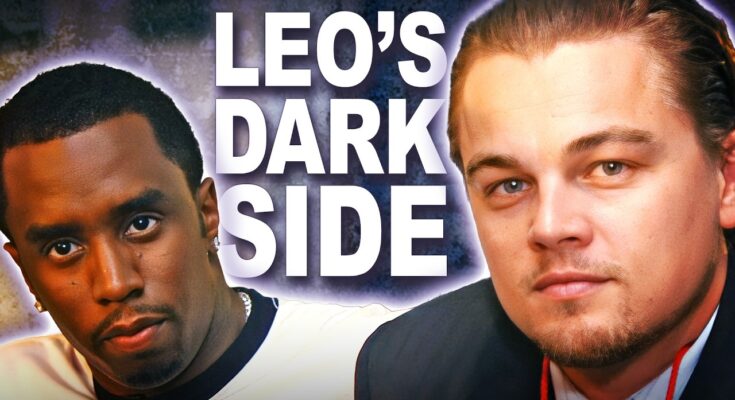The Unseen Spotlight: How Leonardo DiCaprio’s Public Persona Has Quietly Eroded
For decades, Leonardo DiCaprio has existed in the rarefied air of a Hollywood demigod. From the heartthrob of Titanic to the Oscar-winning powerhouse of The Revenant, his career is a masterclass in cinematic evolution. His public image, meticulously curated, has been that of the serious actor, the environmental crusader, the charming philanthropist. Yet, in recent years, a persistent, unsettling narrative has shifted from the tabloid margins to the mainstream consciousness. The downfall of Leo’s reputation hasn’t been a spectacular crash but a slow, steady dimming—a shadow cast by his own actions, which have been hiding in plain sight all along.
The most glaring and frequently cited aspect of this “shady” persona is his well-documented dating pattern. The “Leo Cut-Off”—the unofficial rule that he does not date women over the age of 25—has morphed from a quirky celebrity joke into a deeply scrutinized and criticized lifestyle choice. It’s a pattern so consistent it has its own Wikipedia section and endless internet memes. While personal life should often be off-limits, the sheer predictability and age disparity have sparked serious conversations about power dynamics, maturity, and a potential inability to relate to women as peers.
This personal pattern stands in stark, hypocritical contrast to his public activism. DiCaprio is a UN Messenger of Peace for Climate Change, a prominent figurehead for global environmental organizations, and a producer of urgent documentaries like Before the Flood. His Instagram feed is a stream of calls to action for the planet. Yet, he is consistently dogged by reports of a massive carbon footprint. His frequent use of private jets and mega-yachts—the most polluting forms of travel—creates a jarring dissonance. As one critic on social media pointedly asked, “How many gallons of jet fuel does it take to fly to a climate conference to warn us about fossil fuels?” This isn’t just a minor contradiction; it’s a fundamental flaw in his credibility. He preaches sacrifice and collective action while seemingly exempting himself from the lifestyle changes he advocates for.
The controversy extends to his financial associations. His name was briefly entangled in the 1MDB scandal, a massive Malaysian sovereign wealth fund corruption case. While DiCaprio was never charged with any wrongdoing and fully cooperated with authorities, he did return millions of dollars in gifts—including a Picasso and an Oscar statuette gifted to Marlon Brando—that were funded with stolen money from the fund. His charity, the Leonardo DiCaprio Foundation, also received significant donations from the same tainted source, which it subsequently returned. Again, while legally in the clear, the episode painted a picture of a man operating in a world of murky, ultra-wealthy connections, where the lines between philanthropy, celebrity, and corrupt finance can become dangerously blurred.
Social media has been the primary accelerant in bringing these issues to the forefront. TikTok and Twitter are filled with videos and threads compiling his dating history with chilling precision.
A popular TikTok video that went viral simply lays out his girlfriends’ names and ages side-by-side with his own at the time, set to an ominous soundtrack. The visual pattern is undeniable and unsettling. The comment sections on his environmental posts are often flooded with remarks about his private jet usage, with users embedding flight tracker data to prove their point.
A quintessential example is this TikTok compilation which has garnered millions of views and comments:
The court of public opinion is not a legal one, but its judgments can be equally damning. The narrative is no longer about a beloved actor’s quirky habits but about a deeper character question. It suggests a persona built on a foundation of “do as I say, not as I do.” The shine of his Oscar win has dulled, replaced by a cynicism that greets his every public move.
This isn’t to dismiss his immense talent or his genuine philanthropic efforts, which have undoubtedly raised millions and awareness for crucial causes. The problem is the erosion of trust. In an era where audiences crave authenticity, DiCaprio’s carefully constructed image feels increasingly like a performance. The environmental hero, the champion of the planet, is simultaneously the guy who won’t date a woman his own age and whose lifestyle contributes significantly to the very problems he claims to fight.
The downfall is not that he is canceled or unemployable—far from it. He remains a formidable box office draw. The downfall is more subtle: it is the loss of untarnished respect. The cracks in the façade, once small and easily ignored, have now widened into a chasm of public skepticism. We are now forced to watch his films, his speeches, and his Instagram posts with a side of cynicism, forever wondering which Leo we are seeing: the dedicated artist and activist, or the shady Hollywood king living by a different set of rules. That question, lingering in the minds of his audience, is the downfall that was always waiting to happen.



